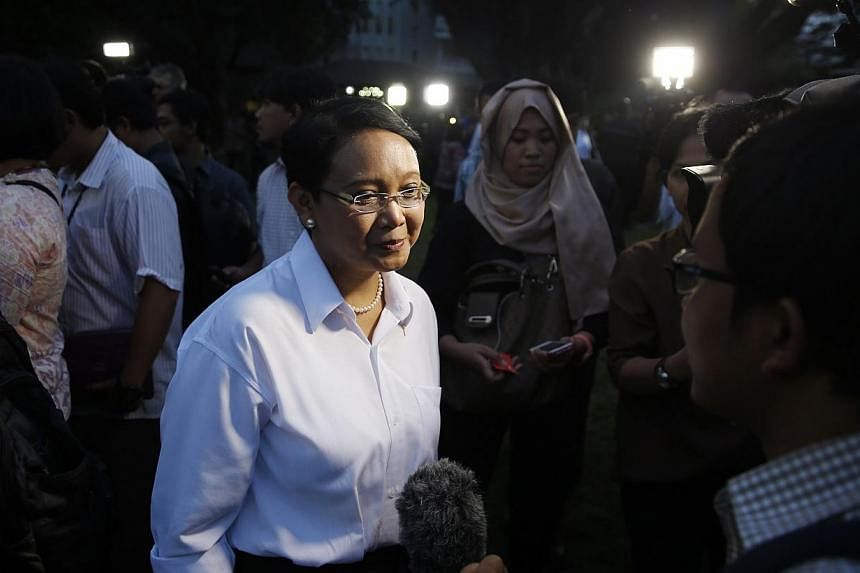Indonesia now has its very own Hillary Clinton. Well, at least of the same gender.
The fact that President Joko Widodo chose a career diplomat was no surprise.
But eyebrows were raised when Ms Retno L. P. Marsudi's name topped the shortlist of candidates in the week prior to Sunday's Cabinet announcement.
Her appointment as Indonesia's first female foreign minister is a proud achievement in empowerment and progress for the country.
Like all women who have trailblazed a career in a "man's world", she bears a heavy burden of expectation.
A monumental task awaits, not only because of the strategic role of the ministry, but also because she follows in the footsteps of a line of predecessors with reputations of stellar diplomacy and luminous eloquence.
The ambassador to the Netherlands rose steadily in her career, as ambassador to Norway and Iceland, and in various sections within the ministry and embassy postings, including director for western European affairs and director of inter-regional cooperation with America and Europe.
She was also deputy director for multilateral economic cooperation with diplomatic postings in Canberra and The Hague as a young diplomat.
It was her appointment as the first female director-general for America and Europe in 2008 that put her on the political radar.
Her linkages to Europe do not stop there. She studied in Holland and her husband is also a graduate of Delft University.
Those who initially questioned her nomination were not cynically sneering at her capacity as a diplomat, nor had reservations over her integrity.
But her track record did not seem to align with Mr Joko's foreign policy vision of maritime diplomacy, an emphasis on economic interest and a focus on Indonesia's immediate concentric circle of interests.
The major complementarity seemed to be that she graduated from the same alma mater - Gadjah Mada University - as the President.
Even if, to some, she may not have seemed the right person for the job at the outset, Ms Retno has every probability of moulding herself as an effective foreign minister.
Mrs Clinton had even less foreign policy experience, yet, as secretary of state, she hastily transformed herself into the biggest advocate of the US State Department, by increasing its budget allocation and creating effective cooperation within her ranks and related institutions, such as with think-tanks and the Department of Defence, and used her celebrity status to positively raise the US' profile wherever she travelled.
The first order of business for Ms Retno is to consolidate support from her colleagues at the Foreign Ministry.
Not just perfunctory support as befits obedient civil servants, but attaining the devotion of a ministry which has, arguably, produced the best line of officials in the bureaucracy but which has become dysfunctional due to internal neglect.
She needs to echo the words of Mr Joko: "We must all work together and work hard!"
Reaching out to the foreign policy community is another imperative.
The challenges today are a far cry from the days of the late Mr Ali Alatas when diplomacy was almost exclusively the preserve of the state.
The strength and reputation of Indonesian diplomacy over two decades have been augmented by the strength of its vibrant civil society, especially Track II and III activities.
Engagement with the established think-tanks and actors in the country's foreign policy community will be Ms Retno's greatest resource in exploring an all-fronts diplomacy.
Their combined reach and network exceed any policy reach the Foreign Ministry can muster by itself.
Almost all aspects of bilateral and regional intercourse have a strong people-to-people dimension and public diplomacy, underlying further the stress on the active forces at work in a modern diplomacy.
Breakthrough initiatives begun by former foreign minister Hassan Wirajuda, such as appointing a vocal NGO activist as Indonesia's representative in the Asean human rights body, must continue and be further expanded.
Twenty-first-century diplomacy is no longer a case of state-sponsored communications, it is inseparable from the strategic engagement of societies with other societies.
Hence, we welcome Ms Retno to "Pejambon", not as Indonesia's first female foreign minister, but as potentially the people's foreign minister akin to the nature of the President.
THE JAKARTA POST/ASIA NEWS NETWORK

